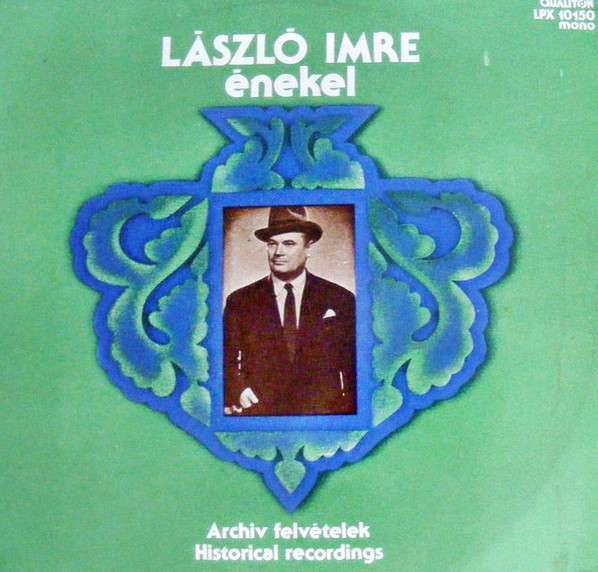
László Imre
László Imre Énekel - Archív Felvételek (Historical Recordings)
Compil. HU 1979 on Qualiton label
World (Romani)
László Imre, a két világháború közötti időszak népszerű nóta énekese. 1896-ban "Csongrádon született. Színi tanulmányait Rákosi Szidi iskolájában végezte. Magyar nótákat 1926ban kezdett hivatásszerűen énekelni és csakhamar egyik kedvence lett a rádióhallgatóknak és a nótát szerető közönségnek. Akkoriban írta első nótáit is. A "Száz szál piros rózsát" kezdetű legismertebb nótája 1928-ban jelent meg és László Imre néhány év leforgása alatt, mint szerző is az élvonalba került. Több alkalommal volt szerzői estje a Vigadóban és a Zeneakadémián. Közben a hanglemezgyárak is rendszeresen foglalkoztatták. Sok régi nóta az ő előadásában és hanglemezfelvételei nyomán lett népszerű. László Imre a felszabadulás után is fáradhatatlanul járta az országot és mindenütt fellépett, ahol csak tehette. Szinte életének utolsó percéig nem szakadt el a nóta-kedvelő közönségtől. 1975. január 1-én váratlanul hunyt el Budapesten. A most kiadásra került hanglemezen szereplő nótákat az 1928 és 1948 közötti időben készült archív felvételeiből válogattuk. (Leszler József) Imre László, a popular singer of the period between the two world wars, was born in 1896, in Csongrád. He studied dramatic art simultaneously taking singing lessons. Following graduation he joined the Pécs Theatre where he played juvenile leads for three years. Later he went to music-hall where he mainly performed chansons. László started to sing professionaly Hugnarian popular songs in 1926, and soon became a favourite of radio listeners and audiences. It was in this period that he began to write songs. His best known song, "Hundred Red Roses" was published in 1928. Within a few years Imre László had become well known as a composer too. He had several composer's night at the "Vigadó" Concert Hall and at the Academy of Music. Record companies made regular recordings with him and many old songs have become popular through his performances and recordings. After the war Imre László continued to travel throughout the country and give performances wherever possible. He maintained his links with the audience virtually till the last minute of his life. He died suddenly on January 1, 1975, in Budapest. The songs on this record are selected from archive recordings made between 1928 and 1948. Laminated sleeve.
Musicians
 | László Imre , vocals, album by |
Producers
| Banda Marci Ciganyzenekara backing band |
| Berkes Béla És Cigány Zenekara backing band |
| Gyula Kóczé Gipsy Band backing band |
| Imre Magyari And His Gypsy Orchestra backing band |
| Kóczé Veres Antal És Zenekara backing band |
| Oláh Kálmán És Zenekara backing band |
| Veres Lajos And His Gipsy-Orchestra backing band |
| Leszler József edited by |
| Sándor Sajnovits graphics |
Album Tracks
| No | Title | Artist | Composer | Duration |
|---|---|---|---|---|
| 1 | Lehullott A Rezgő Nyárfa (The Leaves Of The Aspen Have Fallen) | László Imre | ||
| 2 | Elmegyek Ablakod Előtt (I Pass Before Your Window) | László Imre | ||
| 3 | Cserfaerdő Újra Zöldül (The Oak Forest Turns Green Again) | László Imre | ||
| 4 | Szomszédasszony, Szomszédasszony (Neighbour Women, Neighbour Women) - Ha Megehülök Kinyitom A Bicskámat (When I Get Hungry I Open My Penknife) | László Imre | ||
| 5 | Száz Szál Piros Rózsát (A Hundred Red Roses) | László Imre | ||
| 6 | Marika (Marika) | László Imre | ||
| 7 | Nem Tudom Én Mit Vétettem (I Don't Know What I Did Wrong) | László Imre | ||
| 8 | Árad A Duna Vize (The Danube Waters Rise) | László Imre | ||
| 9 | Esik Eső Hegyen, Völgyön (It Rains Over Hill And Dale) | László Imre | ||
| 10 | Ha Az Enyém Volnál (If You Were Mine) | László Imre | ||
| 11 | Hogyha Ír Majd Édesanyám (When You Write To Me, Mother) | László Imre | ||
| 12 | Badacsonyi Kéknyelűt (Badacsony Kéknyelű Wine) | László Imre | ||
| 13 | Ütött-Kopott Öreg Csárda (Tumbledown Old Inn) | László Imre | ||
| 14 | Kiballagok A Vasúthoz (I Trudge Out To The Railway) | László Imre | ||
| 15 | Nem Való Bokréta, Gyűrött Süveg Mellé (A Bouquet Does Not Suit A Crumpled Cap) | László Imre | ||
| 16 | A Cigányok Sátora (The Gypsies' Tent) | László Imre |
